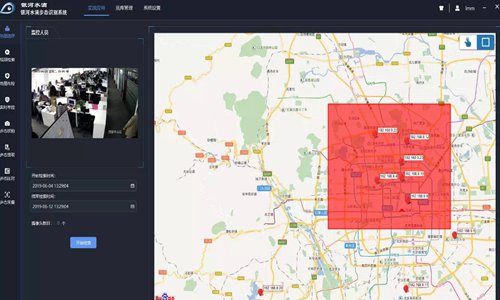HOME >> CHINA
Chinese cities pilot gait recognition system
By Liu Caiyu Source:Global Times Published: 2019/7/4 17:32:21

Beijing-based firm WATRIX reveals a tracking system that can mobilize tens of thousands of real-time cameras to recognize a person's gait and help police nab suspects. Its pilot system is being used in some Chinese cities. Photo: Courtesy of WATRIX
Some Chinese cities are piloting a tracking system that can mobilize tens of thousands of real-time cameras to recognize a person's gait and help police nab suspects, the firm that develops the technology revealed to the Global Times on Thursday.
Developed by the Beijing-based WATRIX, a company incubated by Institute of Automation under the Chinese Academy of Sciences, the system can locate and track targeted suspects by monitoring their postures from ten thousands of either real-time or offline videos.
By analyzing a person's posture, the system can precisely and automatically track a person from videos and issue an alarm at any time if it spots someone doing something suspicious or illegal. The system is designed to relieve public security authorities from manually sifting through vast amounts of video to identify a suspect.
Traditional monitoring systems store and playback video but it is often unable to quickly and accurately identify, locate and find suspects due to poor video quality or if a suspect wears a disguise.
WATRIX told the Global Times that a pilot system is being used in Central China's Hubei and South China's Guangdong provinces, and Shanghai.
The system can be used in public places including airports, bus stations, and schools or used to detect intrusions into key infrastructure facilities such as nuclear power stations and oil refineries, the team said.
Every person's posture is unique, like a fingerprint, and gait recognition technology is capable of secretly identifying targets from any angle, even if their face is covered and at night, Huang Yongzhen, CEO of WATRIX, told the Global Times earlier.
The technology will supplement China's campaign to make Chinese cities and rural areas safer, which includes the projects Xueliang, or Sharp Eyes and Safe City, a professor at the National Defense University of the People's Liberation Army in Beijing who requested anonymity told the Global Times on Thursday.
The Sharp Eyes project is a surveillance network in rural areas using artificial intelligence, facial recognition and big data. The Safe City project is an urban security network that uses a city's surveillance camera network to detect crimes and traffic flow.
Using AI, facial recognition, big data and gait recognition technology, public security departments will be able to better solve crimes and reduce the crime rate, the professor noted.
Addressing privacy concerns, the team said the data captured by the system is only accessible to authorized users, and the company cannot access to the system.
Gait recognition technology can also be used to design smart home furniture, according to the team.
RELATED ARTICLES:
Posted in: SOCIETY,CHINA FOCUS